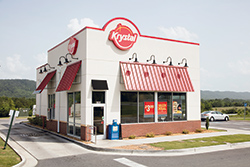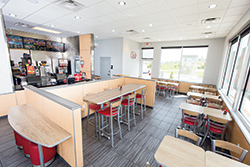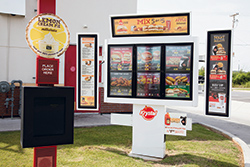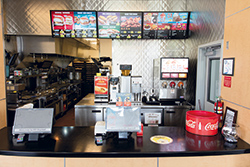Krystal, the 84-year-old, Southern quick-service burger concept, partnered with Georgia Power to implement a new energy-saving program and test several other initiatives.
 Krystal has retrofitted the exterior lighting at 152 stores with a savings of $1,100 to $1,200 per store. The 350-unit chain started by replacing external lighting with energy-saving LED bulbs at 72 of its Georgia locations. This translated into 600 light fixture replacements over the course of 3 months last year and a total energy-saving rebate of $60,000 as well as an overall savings of more than 2,800,000 kilowatt hours across the state. Krystal has since retrofitted 152 stores throughout the South with annual savings of $1,100 to $1,200 per store.
Krystal has retrofitted the exterior lighting at 152 stores with a savings of $1,100 to $1,200 per store. The 350-unit chain started by replacing external lighting with energy-saving LED bulbs at 72 of its Georgia locations. This translated into 600 light fixture replacements over the course of 3 months last year and a total energy-saving rebate of $60,000 as well as an overall savings of more than 2,800,000 kilowatt hours across the state. Krystal has since retrofitted 152 stores throughout the South with annual savings of $1,100 to $1,200 per store.
“We’re looking to run an environmentally conscious business, so we started with the low-hanging fruit — LED lighting — and the proof is in the pudding,” says Brian Blosser, vice president of development and construction at Krystal. The chain plans to install LED lighting in all new restaurant locations and remodels throughout the country as well as in select existing stores over the next several years. Krystal is also continuing to research replacing lightbulbs within the restaurants too.
The changes follow a new 1,700-square-foot prototype design and rollout that began 3 years ago for new Krystal locations and remodels. For that redesign, the chain revamped the logo and its restaurant exteriors. Showcasing the company’s brighter red lettering by contrasting it with white light allows Krystal’s restaurants to stand out more prominently on the street level. The chain also updated the interior design with red and warm walnut colors, new seating and an overall brighter and more airy feel.
 Krystal’s updated interior design features red and warm walnut colors, new seating and an overall brighter and more airy feel. “We used to be a 75 percent drive-thru business but wanted to bring people back inside our four walls with a bolder and brighter look that differentiates us from other QSRs,” Blosser says. “We also wanted to introduce the brand to people who may not have ever come into a Krystal before, and the new design is a way to compete with the growth of fast casual.” The new lighting and other energy-saving initiatives represent the next steps in overall brand enhancements, he adds.
Krystal’s updated interior design features red and warm walnut colors, new seating and an overall brighter and more airy feel. “We used to be a 75 percent drive-thru business but wanted to bring people back inside our four walls with a bolder and brighter look that differentiates us from other QSRs,” Blosser says. “We also wanted to introduce the brand to people who may not have ever come into a Krystal before, and the new design is a way to compete with the growth of fast casual.” The new lighting and other energy-saving initiatives represent the next steps in overall brand enhancements, he adds.
To research possible energy-saving options, Krystal took the initiative and reached out to its main power company, Georgia Power. While retrofits first took place in stores throughout Georgia, Florida and Alabama, the power company has since expanded its footprint such that Krystal has now been able to update locations throughout Tennessee. Georgia Power has partnered with different manufacturers outside the main region to source LEDs with the same standards for store locations in those areas.
Operating Leases for Lights
 Krystal’s lighting plan considered parking lot safety.LED lighting retrofits don’t come cheap, they can often require a hefty up-front investment before savings can be realized over time, and the cost for Krystal would have been up to $12,000 dollars. To help with that burden, Georgia Power offered a two-year operating lease for the lights such that Krystal could make multiple payments over a period of time to save capital. “If there is any damage to the bulbs, Georgia Power will fix or replace them free of charge,” says Blosser. And the chain has the opportunity to buy out or continue leasing after the two-year deadline.
Krystal’s lighting plan considered parking lot safety.LED lighting retrofits don’t come cheap, they can often require a hefty up-front investment before savings can be realized over time, and the cost for Krystal would have been up to $12,000 dollars. To help with that burden, Georgia Power offered a two-year operating lease for the lights such that Krystal could make multiple payments over a period of time to save capital. “If there is any damage to the bulbs, Georgia Power will fix or replace them free of charge,” says Blosser. And the chain has the opportunity to buy out or continue leasing after the two-year deadline.
It’s a great deal that not all power companies offer, but it’s worth looking into for all operators interested in updating lighting, Blosser says. Alternatively, purchasing the bulbs up front, while it does require more capital, will save on regular bulb replacements over time since LEDs last for years. And at $500 to $600 per metal halide bulb plus the cost of service to replace the bulb, which can also run into the hundreds, the price to lease the LEDs — with free service included — made more sense for the chain.
Beyond simply leasing the bulbs, Krystal had to develop a plan for installing and setting up the lights “We tried different angles in five different locations, and once we found the right setup, we mimicked that for the other locations,” says Blosser. “We wanted to have a nice beacon spotlight for the building from a distance and make our outdoor environment and parking lot safer but not blind anyone.”
The next step will be replacing interior lights. To start, the chain has collaborated with Georgia Power to set up meters in order to study the energy-saving potential and determine how many bulbs will be necessary for replacements.
Energy-Saving Equipment
 The chain plans to update its interior lighting soon.In addition to the external LED retrofits, Krystal worked with Georgia Power to conduct energy performance testing for potential equipment replacements at the power company’s Energy Innovation Center located in Atlanta.
The chain plans to update its interior lighting soon.In addition to the external LED retrofits, Krystal worked with Georgia Power to conduct energy performance testing for potential equipment replacements at the power company’s Energy Innovation Center located in Atlanta.
“We have adopted into our system a new energy-efficient fryer that is a two-vat system with three baskets and faster recovery times,” Blosser says. “With rebates, we saved $2,800 per unit and 15 percent to 20 percent of oil usage.”
Blosser’s team is looking into upgrading Krystal’s grills, refrigeration systems and holding cabinets — both gas and electric — and eventually its HVAC systems by conducting energy-efficiency tests at the Energy Innovation Center. “We are beta testing in the field and expect to see an increase in the quality of the product and energy savings that will make our new upgrades a standard spec for any replacement equipment,” he says.
Some of the newer models consistently apply the heat across the grill to cook product faster. This also allows for a more consistent end product, Blosser says. Recovery times have increased as well, which helps with throughput.
“Our number-one concern is product quality, followed by speed,” he says. “We want to know which pieces will give us the best results in a hostile, high-volume environment during peak consumption time. It’s great to test for these things in a controlled environment to make the right decision about equipment.”
More power companies across the country continue to partner with chains to conduct demos and testing of this nature. Blosser says Krystal is not the first to conduct this type of research and certainly won’t be the last. He encourages other chains and even independents to reach out to their local power companies about programs similar to the one Krystal has participated in. FE&S




